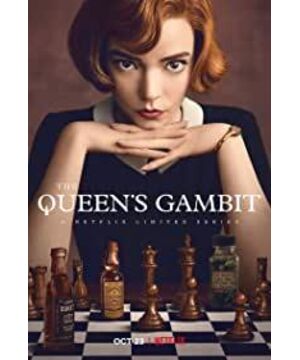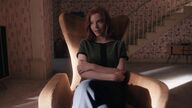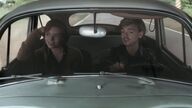I have to say that the plot of "Abandoned Soldiers on the Rear Wing" seems plain, but the details are very sophisticated. It is a very recent growth biography short play. Even if you read it from start to finish, you can still play it over and over again. And there are also some psychoanalytic expressions of psychology fragments, and it is hard not to admire the crew's dedication.
== Contains spoilers, be careful. ==
I have to say that the plot of "Abandoned Soldiers on the Rear Wing" seems plain, but the details are very sophisticated. It is a very recent growth biography short play. Even if you read it from start to finish, you can still play it over and over again. And there are also some psychoanalytic expressions of psychology fragments, and it is hard not to admire the crew's dedication.
The main line of the short film started with the heroine Beth entering the orphanage, which was also the source of her subsequent series of conflicts. As for Beth's previous experience, one or two can be learned from her memories.
1- happened before
We can find such fragments in the play:
▲ Mother and daughter were on the grass by the lake, and then mother put her daughter on the shore, turned and jumped into the lake alone to swim into the distance. Just when the daughter thought her mother was going to disappear forever in the water and was about to cry sadly, her mother turned back and embraced her again.
For ordinary people, it is impossible to swim such a long distance in one breath. But on the other hand, this probably reflects the children's cognition of time and space-the mother's leaving disappeared, with a full sense of death, and the mother's reappearing is as happy as rebirth.
After so many times of "separation-return" exercises, the child can finally realize that he and his mother are two people. After forming their own personality, the child will have basic energy and can enter the ternary relationship with the participation of the "father". Going to the game.
2- Here comes the problem
The problems encountered when entering the ternary relationship are described in this film:
▲ Mom drove her daughter to find his father, saying that they are encountering great difficulties in life. But obviously, the father did not intend to help them. In desperation, the mother chose to take her daughter to end her life, but Beth survived and entered the orphanage.
The difficulties described by the mother can be explained as financial difficulties on the one hand; on the other hand, it is likely to imply that the daughter's growth has reached an important stage that requires the participation of the father.
But the father rejected the mother. In a sense, this seemed to mean that in the eyes of the hostess, the external rules were not friendly to her. Therefore, the heroine always carries a kind of rampage in her later life-the sparkle when she succeeds, the anger after frustration. These are all primitive vitality seeking expression—continuously exploring the boundaries of rules, hoping to win from the power system—allowing the world to accept instincts to flood the sea.
(In psychoanalysis, father represents rules, boundaries, power...)
3- Beginning of Reincarnation
So unsurprisingly, the manager who taught her to play chess in the basement was a man, and at the beginning he said that playing chess is not an activity suitable for girls. This is a manifestation of "unfriendly patrilineal rules" in the play. ▼
Later, the administrator was moved by the heroine's talent and began to hand the heroine to play chess. But we can see that the rules of chess are shown to the heroine through confrontations. In a sense, the chess game symbolizes the rules; playing chess symbolizes the heroine's exploration of the boundaries of the rules, which is also throughout the entire film. ▼
Many people are persuading the heroine that playing chess should not be the whole life. Such as her adoptive mother.
For example, Harry Baird, the first "coach" of the heroine, said that the heroine is too aggressive, saying that he is not as obsessed with chess as before, and he is no longer obsessed with winning to the degree that he must win; ▼
Later, she told the hostess that she was very worried about her situation. She now enjoys the job in the supermarket and her colleagues are also very friendly. ▼
(It can be seen that at this time, Harry prefers matrilineal gentleness and tenderness, and lacks the patriarchal desire for competition, so he will definitely part ways with the heroine.)
Therefore, the heroine will be attracted by the second "coach" Benny, who carries a dagger at any time, is more aggressive, and has clear boundaries (persisting on letting the heroine sleep in the living room). This is a manifestation of patrilineal power. But in the same way, it is difficult for them to get together because Benny lacks the necessary maternal affinity—too much of oneness (refusing to help the heroine financially), and can even discuss the chess game with the heroine at intimate moments, ▼
He who loves himself more. ▼
4- The power of seeing
"The feeling of'I' must be seen by'you' before it begins to exist." When the former little friend Qiao Lin reappeared in front of the deep-pitted Beth with "Modern Chess Opening"; when Beth decided to re-emerge Back to the orphanage, when I returned to the basement, I found that the administrator had left a wall-filled briefing about her and a group photo of them; and the next morning after the closing, the phone companion gave her a plan. These all herald the reconciliation between the heroine and the conflict in the past relationship.
"When the energy is seen, all energy can be transformed into good." This is why the play arranges to change the habitual method at the last critical moment, and the heroine can complete her own without fear and confidence. This is Beth’s "heroic journey".
Perhaps at a certain moment, we have all had the psychological experience of being an orphan. So when we watched this short play, we felt very distracted. But I believe that when we decide to be our own masters, then we will eventually go out of our own "heroic journey."
5-BTW
▼0 1 / Beth when she sees it , she will involuntarily think of the Aimei in "Angel Loves the Beauty". They are all alive and energetic women.
0 ▼ 2 / shellfish after the wire was invited to a party pie was a joke "learn" chess party that night appeared associated with innuendo. (Attention, this shadow is "king" rather than "queen"?)
03 / The design of the two basements-the basement in the orphanage, Benny's house-to some extent has metaphors similar to "womb" and "deep inner world". (Maybe a bit far-fetched)
0 ▼ 4 / shellfish wire respond father to beg for the emergence of real estate, is the adoptive mother of her worn coat.
0 ▼ 5 / shellfish wire said Jolene, maybe I would have is crazy; the corresponding mean when she told reporters in front of "genius on the left, on the right madman."
▼ 06 / and some other interesting dialogues
View more about The Queen's Gambit reviews











